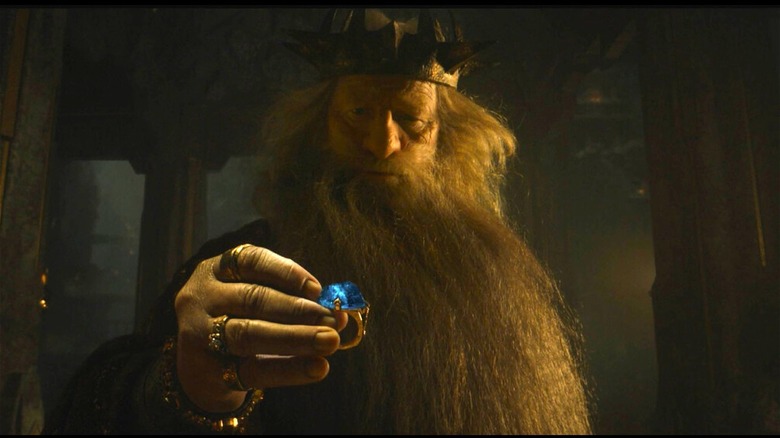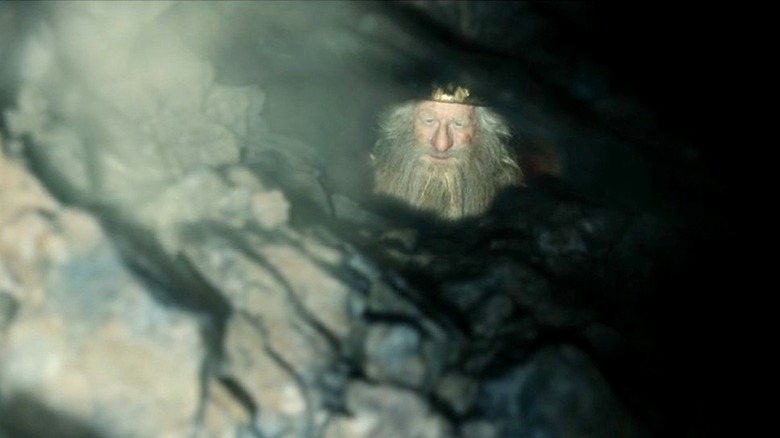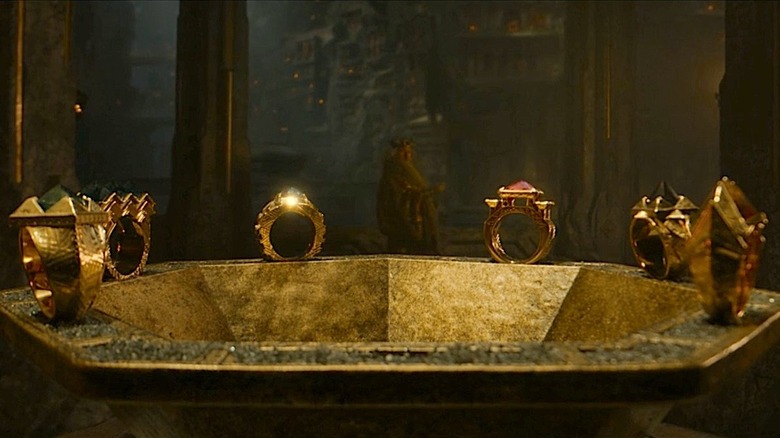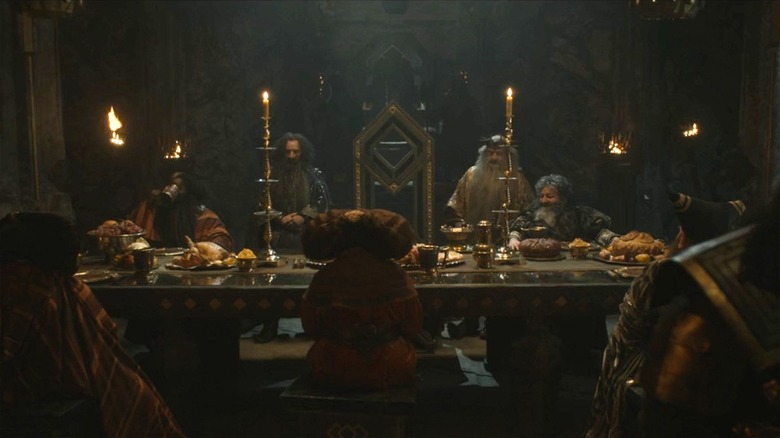What The Dwarven Rings Actually Do In The Lord Of The Rings Books
J.R.R. Tolkien's Ringverse is one of the better-known parts of the author's legendarium. You know what we're talking about — the one that starts "Three Rings for the Elven-kings under the sky, Seven for the Dwarf-lords in their halls of stone," and so on. The lyrics list a total of 20 Rings of Power floating around Middle-earth. We hear about the Three for Elves quite a bit. The Nine for Mortal Men are obviously the Sauron-dominated Ringwraiths. And the One Ring speaks for itself.
But what about the Dwarven rings? Unlike the Three (which preserve and protect) and the Nine and One (which are about dominating wills), the Dwarven Rings simply inflame and exacerbate the desires of the Dwarf kings, causing them to be obsessed with treasure, fiercely jealous, and excessively stubborn.
The Seven Rings for the Dwarf-lords barely show up in the intro to Peter Jackson's movies, and it took a whole season of "The Rings of Power" for them to make an appearance. Now, finally, we've seen them forged in the first half of "Rings of Power" Season 2, and the show is starting to reveal some of the weird things that they can do. But how accurate are these powers compared to what Tolkien said in his books of lore? Let's compare and contrast.
How do the Dwarven Rings work in The Rings of Power?
Episode 5 of "The Rings of Power" Season 2 gives us a thorough glimpse into the effects of the show's Dwarven trinkets. Durin III (Peter Mullan) starts the episode by donning his new toy and realizing that he can tell his miners where to dig in order to unbury the blocked sunshine shafts. Later, he tells his son, Durin IV (Owain Arthur), that he can "see" jewels and riches through the stone.
As the episode progresses, we begin to see King Durin's attitude shift. He becomes possessive of the Ring and starts to look for the best way to accumulate as much wealth as possible in every transaction, business or otherwise. The behavior is unusual for the elderly king and alarming enough that it prompts Durin IV to return to Celebrimbor to determine if something is wrong with his Ring of Power. Is this how Dwarven rings actually work in Tolkien's texts, though? As with quite a few things with the Amazon Studios show, the answer is "kind of."
What does Tolkien actually say about Dwarf rings?
As with the Nine Rings, Sauron creates the Seven Rings with the intention of subduing the Dwarf-lords to his will. However, this ends up backfiring on the Dark Lord when theory is put into practice. The appendices of "The Return of the King" explain, "The Dwarves had proved untameable by this means. The only power over them that the Rings wielded was to inflame their hearts with a greed of gold and precious things, so that if they lacked them all other good things seemed profitless, and they were filled with wrath and desire for vengeance on all who deprived them."
While it drives the Dwarves' to have an insatiable desire for treasure, their Rings don't affect their will or allow others to dominate them. The text even addresses this, saying, "Though they could be slain or broken, they could not be reduced to shadows enslaved to another will; and for the same reason their lives were not affected by any Ring, to live either longer or shorter because of it."
"The Silmarillion" offers an even more on-the-nose summation of the effect and powers of the Seven, saying, "[The Dwarves] used their rings only for the getting of wealth; but wrath and an over-mastering greed of gold were kindled in their hearts, of which evil enough after came to the profit of Sauron." We then get the foreboding line, "It is said that the foundation of each of the Seven Hoards of the Dwarf-kings of old was a golden ring; but all those hoards long ago were plundered and the Dragons devoured them, and of the Seven Rings some were consumed in fire and some Sauron recovered."
Dwarven Rings are extremely effective duds
When you add it all up, the Dwarven rings don't really function in quite the practical and logistical way that we're seeing in "The Rings of Power." They aren't mining tools, nor do they give Dwarves x-ray vision. Instead, Tolkien clearly positions the Seven Rings as "failures" in the eyes of their maker, items that simply don't do what he wants his Rings of Power to do.
Sauron wishes to dominate the wills of the Dwarf-lords who wear them, but instead, they prove indomitable. Their strong-willed nature also means the Rings don't even make them live longer or become "thin and stretched," as happens to the Nazgûl, Gollum, and even Bilbo when they're exposed to other Rings of Power for prolonged times.
Instead, each Dwarf-king who possesses one of the Seven becomes obsessed with gaining wealth and is defined by greed and jealousy over their possessions. While less easy to control than the Nine Rings, Sauron ends up causing plenty of cursed problems for the Dwarves indirectly, as their kind continue to fruitlessly chase wealth over the generations, driven by a Ring-powered obsession at every step.



